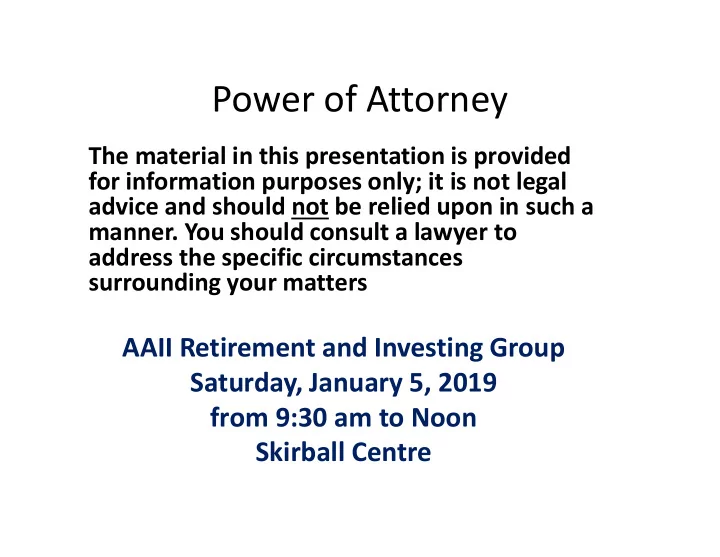

Power of Attorney The material in this presentation is provided for information purposes only; it is not legal advice and should not be relied upon in such a manner. You should consult a lawyer to address the specific circumstances surrounding your matters AAII Retirement and Investing Group Saturday, January 5, 2019 from 9:30 am to Noon Skirball Centre
What is a Power of Attorney? Judith M. Sack 2019
Judith M. Sack 2019
How are they created? Judith M. Sack 2019
The principal directs any actions the agent takes on his or her behalf Judith M. Sack 2019
California Practice Preference for Finances specific documents Health Care for different uses, Digital Assets for example: What is not a power of attorney? Judith M. Sack 2019
Power of Attorney for Financial Matters Judith M. Sack 2019
Statutory Form • _________ (A) Real Property Transactions. • _________ (B) Tangible Personal Property Transactions. • _________ (C) Stock and Bond Transactions • _________ (D) Commodity and Option Transactions. • _________ (E) Banking and other Financial Institution Transactions. • _________ (F) Business Operating Transactions. • _________ (G) Insurance and annuity transactions. • _________ (H) Estate, Trust, and other Beneficiary Transactions. • _________ (I) Claims and Litigation. • _________ (J) Personal and Family Maintenance. • _________ (K) Benefits from Social Security, Medicare, Medicaid, or other • governmental programs or civil or military service. • _________ (L) Retirement plan Transactions. • _________ (M) Tax matters. • _________ (N) ALL OF THE POWERS LISTED ABOVE. Judith M. Sack 2019
Statutory Form Versus Detailed Example of detailed provision dealing with Real Property: Statutory form: _________ (A) Real Property Transactions. Detailed power of attorney: (1) Real and Personal Property. To take any actions for the management or maintenance of any real or personal property in which I own an interest when this Power is executed, or in which I later acquire an interest, including the power to acquire, sell, and convey ownership of property; control the manner in which property is managed, maintained, and used; change the form of title in which property is held (including creating or severing a “joint tenancy” right of survivorship); satisfy and grant security interests and other encumbrances on property (including a "reverse mortgage"); obtain and make claims on insurance policies covering risks of loss or damage to property; accept or remove tenants; collect proceeds generated by property; ensure that any needed repairs are made to property; exercise rights of participation in real estate syndicates or other real estate ventures; make improvements to property; and, perform any other acts described in California Probate Code §§4451 and 4452. Judith M. Sack 2019
Power of Attorney for A Specific Transaction Judith M. Sack 2019
Digital Assets Judith M. Sack 2019
Power of Attorney for Health Matters Judith M. Sack 2019
Trends Attorney prepared documents versus bank forms. Health care insurer forms versus attorney created documents. Judith M. Sack 2019
THIS PRESENTATION IS NOT LEGAL ADVICE Your presenter: Judith M. Sack Estate Planning Attorney The contents were provided for information purposes only, and should not be relied upon as legal advice. You should consult a lawyer to address the specific circumstances of your situation. Judith M. Sack 2019
Recommend
More recommend